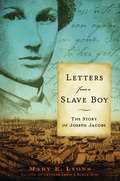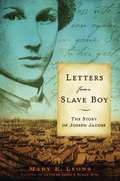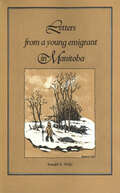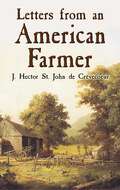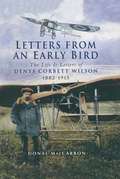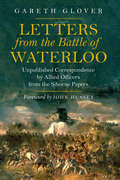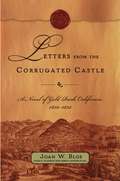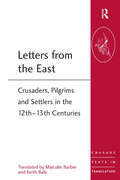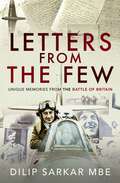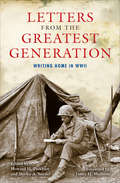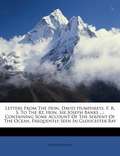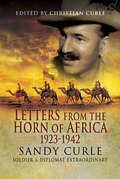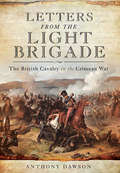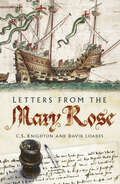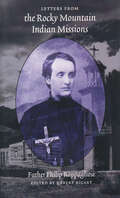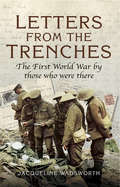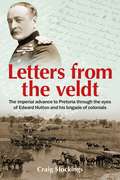- Table View
- List View
Letters from a Slave Boy
by Mary E. LyonsLike his mother and grandmother before him, Joseph Jacobs was born into slavery. Joseph lives with his grandmother and sister in North Carolina, but he has not seen his mother for more than seven years. Unbeknownst to Joseph, his mother, Harriet, has been hiding from her owner in the attic of the house that Joseph lives in. But when Harriet's hiding place is in danger of being revealed, she is forced to flee north to safety only moments after being reunited with her family.Devastated by losing his mother for the second time, Joseph begins to ponder the nature of the world he lives in. Soon Joseph, seeking freedom and a place where he can be himself, follows his mother north. As he searches for answers, Joseph experiences life in Massachusetts, California, Australia, and aboard a whaling ship--but there's no place where Joseph feels that he can truly be free.In this companion novel to Letters from a Slave Girl, Joseph's stirring quest for freedom and identity is told through letters imagined by the author. Based on the real-life stories of Harriet and Joseph Jacobs, Letters from a Slave Boy is set against the backdrop of some of the most exciting and turbulent times in American history.
Letters from a Slave Boy: The Story of Joseph Jacobs
by Mary E. LyonsA fictionalized look at the life of Joseph Jacobs, son of a slave, told in the form of letters that he might have written during his life in pre-Civil War North Carolina, on a whaling expedition, in New York, New England, and finally in California during the Gold Rush.
Letters from a Slave Boy: The Story of Joseph Jacobs
by Mary E. LyonsLike his mother and grandmother before him, Joseph Jacobs was born into slavery. Joseph lives with his grandmother and sister in North Carolina, but he has not seen his mother for more than seven years. Unbeknownst to Joseph, his mother, Harriet, has been hiding from her owner in the attic of the house that Joseph lives in. But when Harriet's hiding place is in danger of being revealed, she is forced to flee north to safety only moments after being reunited with her family.Devastated by losing his mother for the second time, Joseph begins to ponder the nature of the world he lives in. Soon Joseph, seeking freedom and a place where he can be himself, follows his mother north. As he searches for answers, Joseph experiences life in Massachusetts, California, Australia, and aboard a whaling ship--but there's no place where Joseph feels that he can truly be free.In this companion novel to Letters from a Slave Girl, Joseph's stirring quest for freedom and identity is told through letters imagined by the author. Based on the real-life stories of Harriet and Joseph Jacobs, Letters from a Slave Boy is set against the backdrop of some of the most exciting and turbulent times in American history.
Letters from a Stoic: The Ancient Classic (Capstone Classics)
by Seneca Donald RobertsonDISCOVER THE ENDURING LEGACY OF ANCIENT STOICISM Since Roman antiquity, Lucius Annaeus Seneca&’s Letters have been one of the greatest expressions of Stoic philosophy. In a highly accessible and timeless way, Seneca reveals the importance of cultivating virtue and the fleeting nature of time, and how being clear sighted about death allows us to live a life of meaning and contentment. Letters from a Stoic continues to fascinate and inspire new generations of readers, including those interested in mindfulness and psychological techniques for well-being. This deluxe hardback selected edition includes Seneca&’s first 65 letters from the Richard M. Gummere translation. An insightful introduction by Donald Robertson traces Seneca&’s busy life at the centre of Roman power, explores how he reconciled his Stoic outlook with vast personal wealth, and highlights Seneca&’s relevance for the modern reader.
Letters from a Young Emigrant in Manitoba
by Norman SchmidtLetters from a Young Emigrant in Manitoba first published in 1883 and long out of print, is one of the best records of Canadian immigrant life. The letters were written by Edward ffolkes, who left England in 1880 to study at the Ontario Agricultural College in Guelph and later to homestead in southern Manitoba. They describe with rare insight the daily struggles and expectations of an “ordinary” man who had the courage to take up a new life on the frontier. Ronald A. Wells has introduced the volume with a wide-ranging essay on the role of popular knowledge about Canada in Britain and the significant shift of British migration from the United States for Canada at the end of the nineteenth century. This edition has been designed in the style of the original, with the addition of Norman Schmidt’s evocative line drawings.
Letters from an American Farmer
by J. Hector de CrèvecoeurAn emigrant French aristocrat-turned-farmer, Jean de Crèvecoeur was granted New York citizenship in 1765 and became a landowner in Orange County. There, he wrote about his farming experiences and interpreted the nation's development in a series of charming and keenly observant essay-length letters about life in the Early Republic. A Baedeker of American culture for Old World readers, the book painted a vivid portrait of the young country, not only detailing seafaring life in New England and plantation culture in the South, but also providing incisive vignettes of the hardships of frontier living and the perilous unrest that existed between fanatical patriots and back-country loyalists. For many Europeans, his essays offered first major impressions of American landscapes, people, institutions, and the problems that stood in the way of making one nation out of diverse former colonies. One of the best-known early accounts of life in eighteenth-century America, Letters from an American Farmer is essential reading for students of colonial history and a must-have for Americana enthusiasts.
Letters from an American Farmer and Sketches of Eighteenth-Century Ameri
by J. Hector Crevecoeur Albert E. StoneAmerica's physical and cultural landscape is captured in these two classics of American history. Letters provides an invaluable view of the pre-Revolutionary and Revolutionary eras; Sketches details in vivid prose the physical setting in which American settlers created their history.
Letters from an Early Bird: The Life & Letters of Denys Corbett Wilson 1882–1915
by Donal MacCarronThis is the story of an early pioneer aviator who took to the air just a few years after the Wright Brothers proved that man was capable of controlled powered flight. Corbett Wilson (CW) was the only son of a wealthy family and was educated at Eaton from 1896 to 1899. He was commissioned into the Dorset Regiment and served in the South African War, by the end of which he had transferred to the Royal Artillery and became a Lieutenant in 1908. CW enrolled at the Bleriot Flying School at Pau in southern France and upon gaining his wings purchased a Bleriot XI aeroplane. Later he flew from Hendon Aerodrome and from there he made the first flight across the Irish Sea. When World War I loomed CW joined the military division of the newly formed Royal Flying Corps and in August 1914 he took off from Dover for France with No. 3 Squadron. It is this point that the vividly written letters sent to his mother give an enthralling insight into the developing war and the early military use of aircraft in battle. He lasted just ten months before being shot down by enemy flack on 15 May 1915.
Letters from the 442nd: The World War II Correspondence of a Japanese American Medic (The Scott and Laurie Oki Series in Asian American Studies)
by Minoru MasudaThis is the first collection of letters by a member of the celebrated 442nd Combat Team, which served in Italy and France during World War II. Written to his wife by a medic serving with the segregated Japanese American unit, the letters describe a soldier’s daily life. Minoru Masuda was born and raised in Seattle. In 1939 he earned a master’s degree in pharmacology and married Hana Koriyama. Two years later the Japanese struck Pearl Harbor, and Min and Hana were imprisoned along with thousands of other Japanese Americans. When the Army recruited in the relocation camp, Masuda chose to serve in the 442nd. In April 1944 the unit was shipped overseas. They fought in Italy and in France, where they liberated Bruyeres and rescued a “lost battalion” that had been cut off by the Germans. After the German surrender on May 3, 1945, Masuda was among the last of the original volunteers to leave Europe; he arrived home on New Year’s Eve 1945. Masuda’s vivid and lively letters emphasize his surroundings, his daily activities, and the people he encountered. He describes Italian farmhouses, olive groves, and avenues of cypress trees; he writes of learning to play the ukulele with his “big, clumsy” fingers, and the nightly singing and bull sessions which continued throughout the war; he relates the plight of the Italians who scavenged the 44 2nd’s garbage for food, and the mischief of French children who pelted the medics with snowballs. Minoru Masuda was professor of psychiatry at the University of Washington. Hana Masuda was Minoru’s wife. Dianne Bridgman is the former manager of the Washington State Oral History Program.
Letters from the Battle of Waterloo: Unpublished Correspondence by Allied Officers from the Siborne Papers
by Gareth GloverWaterloo is probably the most famous battle in military history. Thousands of books have been written on the subject but mysteries remain and controversy abounds.By presenting more than 200 previously unpublished accounts by Allied officers who fought at the battle, this collection goes right back to the primary source material. In the letters the Allied officers recount where they were and what they saw. Gareth Glover has provided historical background information but lets the officers speak for themselves as they reveal exactly what happened in June 1815.Originally sent to, and at the request of, Captain W Siborne, then in the process of building his famous model of the battle, these letters have remained unread in the Siborne papers in the British Library. A small selection was published in Waterloo Letters in 1891 but much of vast historical significance did not see the light then and has remained inaccessible until now. Glover now presents this remarkable collection which includes letters here by Major Baring, George Bowles, Edward Whinyates, John Gurwood and Edward Cotton as well as letters by Hanoverian and King's German Legion officers.This is a veritable treasure trove of material on the battle and one which will mean that every historian's view of the battle will need correcting.
Letters from the Corrugated Castle
by Joan W. BlosDear Cousin Sallie,I begin with words I never thought to write:I am not an orphan!Thirteen-year-old Eldora has always believed that her mother died when she was very little, and for nine years she has lived with people that she calls Aunt and Uncle. The year is 1850, and all three have exchanged their quiet lives in New Bedford, Massachusetts, for new ones in San Francisco, the rapidly growing city that is the heart of the California Gold Rush. Shortly after their arrival, they receive a letter from an unknown woman who believes she is Eldora's mother. She is eager to meet her long-lost daughter, and a visit is arranged. As Eldora deals with her conflicting feelings about this news, she must also adjust to the challenges -- and dangers -- of living in a brash and growing city. She finds herself teaching English to twoMexicanochildren and beginning to learn Spanish, and an unlikely friendship with a boy named Luke introduces her to the hard, sometimes humorous, and often violent world of the mining camps. Every day seems to bring something different and new to consider. But can Eldora discover where -- and to whom -- she belongs?Told in letters that ring with the voice of the times,Letters from the Corrugated Castleis an intriguing adventure set in a fascinating time in California's history -- a worthy conclusion to the geographical trilogy begun withA Gathering of Days,winner of the Newbery Medal, andBrothers of the Heart.
Letters from the East: Crusaders, Pilgrims and Settlers in the 12th–13th Centuries (Crusade Texts in Translation #18)
by Malcolm Barber Keith BateNo written source is entirely without literary artifice, but the letters sent from Asia Minor, Syria and Palestine in the high middle ages come closest to recording the real feelings of those who lived in and visited the crusader states. They are not, of course, reflective pieces, but they do convey the immediacy of circumstances which were frequently dramatic and often life-threatening. Those settled in the East faced crises all the time, while crusaders and pilgrims knew they were experiencing defining moments in their lives. There are accounts of all the great events from the triumph of the capture of Jerusalem in 1099 to the disasters of Hattin in 1187 and the loss of Acre in 1291. These had an impact on the lives of all Latin Christians, but at the same time individuals felt impelled to describe both their own personal achievements and disappointments and the wonders and horrors of what they had seen. Moreover, the representatives of the military and monastic orders used letters as a means of maintaining contact with the western houses, providing information about the working of religious orders not found elsewhere. Some of the letters translated here are famous, others hardly known, but all offer unique insight into the minds of those who took part in the crusading movement.
Letters from the Few: Unique Memories from the Battle of Britain
by Dilip SarkarFascinated by the Battle of Britain from an early age, as a young man Dilip Sarkar realized that recording and sharing the Few’s memories was of paramount importance. At the time, back in the mid-1980s, membership of the Battle of Britain Fighter Association was well populated and the then Honorary Secretary, the now late Wing Commander Pat Hancock DFC, OBE, supported Dilip’s research by forwarding letters to individual pilots of interest. Those members of the Few included a wide-range of personalities, from famous airmen like Group Captain Peter Townsend and Air Marshal Sir Denis Crowley-Milling, to the ‘also rans’, as Battle of Britain Hurricane pilot Peter Fox famously described himself and peers. Indeed, it was Peter’s ‘also rans’ that were of the greatest interest to Dilip, who recognized that whilst many famous and distinguished pilots had either published personal memoirs or had biographies written about them, lesser-lights had no platform to record and share their experiences. This Dilip became dedicated to resolving. For many years, Dilip enjoyed prolific correspondence with the Few. These letters – hundreds of them – now represent a unique primary source, confirming the incredibly close relationship the author enjoyed with his heroes and high esteem in which they likewise held him. Over the years, Dilip’s published work has enormously benefited from his unique knowledge of the people involved through this very personal association, the memories collated providing his books a real ‘human’ touch. As the Few sadly fade away, it is only now that the significance of Dilip’s correspondence, industry and archive arising are becoming truly apparent. In Letters From The Few, Dilip shares with us, for the first time, a small selection of his correspondence with Battle of Britain fighter pilots, providing us an inspirational insight into the immeasurable value of this research and personalities involved.
Letters from the Front
by Andrew RobertsSimilar to Letters From Iwo Jima and All Quiet On The Western Front, this book tells the story of young men from many nations thrown into the crucible of war, fighting not just to survive, but to understand what was happening to them and their comrades. It tells it in the words of the soldiers themselves, in their letters home.A legacy of an empire and a nation at war, Love, Tommy, is a collection of letters housed at Imperial War Museums sent by British and Commonwealth troops from Canada, Australia, New Zealand and South Africa from the front line of war to their loved ones at home. Poignant expressions of love, hope and fear sit alongside amusing anecdotes, grumbles about rations and thoughtful reflections, eloquently revealing how, despite the passage of time, many experiences of the fighting man are shared in countless wars and battles. From the muddy trenches of the Somme to frozen ground of the Falklands to the heat and dust of Iraq, these letters are the ordinary soldier's testament to life on the front line.
Letters from the Greatest Generation: Writing Home in WWII
by Howard H. Peckham & Shirley A. SnyderA collection of personal letters from overseas that reveal in day-to-day detail what it was like to serve in World War II. Recounting victory and defeat, love and loss, this is a remarkable and frank collection of World War II letters penned by American men and women serving overseas. Here, the hopes and dreams of the greatest generation fill each page, and their voices ring loud and clear. &“It&’s all part of the game but it&’s bloody and rough,&” writes one soldier to his wife. &“Wearing two stripes now and as proud as an old cat with five kittens,&” remarks another. Yet, as many countries rejoiced on V-E Day, this book reveals that soldiers were &“too tired and sad to celebrate.&” Filled with the everyday thoughts of these fighters, the letters are by turns heartbreaking and amusing, revealing and frightening. While visiting a German concentration camp, one man wrote, &“I don&’t like Army life but I&’m glad we are here to stop these atrocities.&” Meanwhile, in another letter a soldier quips, &“I know lice don&’t crawl so I figured they were fleas.&” A fitting tribute to all veterans, this book brings the experience of war—its dramatic horrors, its dreary hardships, its desperate hope for a better future—to vivid life. &“An intimate portrait of the mundane and remarkable, of heroism and terror, of friendship and loss . . . Timely, compelling, and important reading.&”—Matthew L. Basso, author of Men at Work
Letters from the Hon David Humphreys, F R S to the Rt Hon Sir Joseph Banks: Containing Some Account of the Serpent of the Ocean, Frequently Seen in Gloucester Bay
by David HumphreysThis is a reproduction of a book published before 1923. This book may have occasional imperfections such as missing or blurred pages, poor pictures, errant marks, etc. that were either part of the original artifact, or were introduced by the scanning process. We believe this work is culturally important, and despite the imperfections, have elected to bring it back into print as part of our continuing commitment to the preservation of printed works worldwide. We appreciate your understanding of the imperfections in the preservation process, and hope you enjoy this valuable book.
Letters from the Horn of Africa, 1923–1942: Sandy Curle, Soldier and Diplomat Extraordinary
by Christian CurleAfter brief service in the Gordon Highlanders as part of the Army of Occupation of the Rhine post Great War, Sandy Curle sought more adventurous soldiering and in 1923 was seconded to the Kings African Rifles (KAR). Aged 23 he found himself in remotest Somaliland in sole charge and the only European for miles. At one point delirious with typhoid he was only saved by the surprise visit of an Indian doctor. Later he served in Kenya and undertook numerous military expeditions.In 1929 Curle joined the Colonial Service again in Somaliland and Ethiopia. He witnessed the Italians aggression which led to their invasion of Ethiopia in 1935. A spell in Tanganyika as a District Officer followed and on the outbreak of war he rejoined the KAR and was attached to the Somaliland Camel Corps when the Italians invaded. Hopelessly outnumbered, Sandy and his men withdrew to Kenya by troopship.His next assignment was to raise, train and command a battalion of Ethiopian irregulars (Curles Irregulars) and with these he led the reoccupation of Ethiopia winning the DSO and Ethiopian Military Medal.In 1966 Curle was one of 25 veterans invited by Emperor Haile Selaise to celebrate the 25th Anniversary of the liberation from Italian rule.This is a vivid and fascinating collection of correspondence covering some 30 years of war and uncertain peace.
Letters from the Light Brigade: The British Cavalry in the Crimean War
by Anthony DawsonThe Charge of the Light Brigade is one of the most famous, controversial and emotive small-scale actions in military history. Over the 160 years since the event, and since it was immortalized in Tennyson's poem, it has generated a stream of writing and debate. Yet, as this new book by Anthony Dawson shows, the subject is far from exhausted. His selection of previously unpublished letters and journal accounts of the two cavalry charges at the Battle of Balaklava is a notable addition to the literature on the Crimean War. It offers a direct insight into events on the battlefield as they were seen and understood by those who witnessed them and by those who took part. In their own words, and in the language of the time, the men who were there recorded what they knew and felt. 'Anthony Dawson's Letters from the Light Brigade offers us a rich source of authentic, very telling soldiers' experiences from the Crimean War. He presents this new collation with a concise, authoritative commentary on the deployment of the Light Brigade and its major actions in Crimea. Of course, that formation's famous charge at Balaklava is given due prominence, but not exclusively so. There are real gems of insight here, both historical and modern: much to fascinate and a great deal to learn. I for one, will never look at or describe the battles and battlefields of the Crimea again in quite the same way. Hence I am delighted to introduce and commend this work as a very valuable and compelling addition to the literature of the Crimean War.' From the foreword by Mungo Melvin, Major General (retired), President, British Commission for Military HistoryAs featured in the Yorkshire Post, Huddersfield Examiner, Yorkshire Standard and on BBC Radio Manchester.
Letters from the Mary Rose
by David Loades C S Knighton‘The authors are to be congratulated on a book which merits usage in the national curriculum.’ - International Journal of Nautical ArchaeologyThe raising of the Tudor warship Mary Rose in 1982 has made her one of the most famous ships in history, though there is a good deal more to her story than its terminal disaster. She served successfully in the Royal Navy for more than thirty years before sinking, for reasons still uncertain, during a battle off Portsmouth in 1545. There have been many books published about Mary Rose but this is the only one written largely by those who sailed with her. It is based around original documents, including all the known despatches written aboard Mary Rose by the commanding admirals. Extracts from accounts and other papers illustrate the building, equipping and provisioning of the ship. Although this is primarily a view from the quarter-deck, there are occasional glimpses of life below. The collection concludes with reports of the sinking, and of the first attempts to salvage the ship and her ordnance.The documents are presented in modern spelling and are set in context through linking narratives. Technical terms are explained, and the principal characters introduced. The texts are supplemented by contemporary images, and by photographs of the preserved ship and recovered objects. A new range of illustrations has been added to this edition, published forty years on from the raising of the hull.
Letters from the Peninsula, 1808-1812, by Lieut.-Gen. Sir William Warre: Ed. by his nephew, the Rev. Edmond Warre
by Rev Edmond Warre Lt.-General Sir William Warre"Gossipy and revealing memoirs of the Anglo-Portuguese soldier who was present at most of the actions of the Peninsular War from Corunna to Salamanca. Warre was rare in having an inside knowledge of Portugal and it shows in this enthralling collection of his frank letters home.William Warre was the spirited scion of one of the great commercial dynasties which helped make Portugal Britain's oldest ally. Brought up in Oporto, his nature was too fiery to take kindly to the dull business of exporting port, and he gratefully left the family firm to take up a military career after sticking the pigtails of his father's Portuguese partner to his desk with sealing wax while the man was sleeping off a liquid lunch. Warre returned to his native city as a young staff officer in 1808, and thereafter witnessed most of the major actions of the conflict at close quarters. He took part in Sir John Moore's winter retreat to Corunna; the storming of the fortress of Ciudad Rodrigo, personally accepted the sword of the surrendering French commander of Badajoz after the famous siege; and fought at Vimieiro and Salamanca among many other actions. After the latter battle he was given the important task of reorganising the Portuguese Army and was Britain's liasion man at the Portuguese court in Lisbon. This volume is composed of letters to Warre's parents. He describes not only the military actions in which he was engaged, but also recounts the gossip among his fellow Staff officers and his own frank observations on the foibles of his Portuguese allies." N&M editionAuthor -- Warre, William, Lt.-General Sir, 1784-1853.Editor -- Warre, Rev Edmond, 1837-Text taken, whole and complete, from the edition published in London, J. Murray, 1909.Original Page Count - xxiii, 312 pages.
Letters from the Rocky Mountain Indian Missions
by Philip RappagliosiLetters from the Rocky Mountain Indian Missions reveals the life of an Italian Jesuit as he worked at three missions in the northern Rocky Mountains from 1874 to 1878. Meticulously translated and carefully annotated, the letters of Father Philip Rappagliosi (1841–78) are a rare and rich source of information about the daily lives, customs, and beliefs of the many Native peoples that he came into contact with: Nez Perces, Kootenais, Salish Flatheads, Coeur d&’Alenes, Pend d&’Oreilles, Blackfeet, and Canadian Métis. These never-before-translated letters reveal the shifting, sometimes volatile relationship between the missionaries and the Native Americans and also provide a window into the complex lives of the Jesuits. After requesting to work among the Native peoples of the American West, Rappagliosi arrived at Saint Mary&’s Mission in the Bitterroot Valley of Montana in 1874, where he spent much time among already converted members of the Salish Flathead Nation. The energetic Rappagliosi journeyed next to Canada to visit some Kootenai Indian bands and then was reassigned to Saint Ignatius Mission, where he interacted with the Upper Pend d&’Oreilles Indians. Rappagliosi&’s final and most difficult assignment was at Saint Peter&’s Mission among the Blackfeet in Montana, who were not converts. There he became embroiled in disputes with a controversial former Oblate priest, and foul play was suspected in his death at the age of thirty-seven.
Letters from the Southern Home Front: The American South Responds to the Vietnam War
by Joseph A. FryJoseph A. Fry’s Letters from the Southern Home Front explores the diversity of public opinion on the Vietnam War within the American South. Fry examines correspondence sent by hundreds of individuals, of differing ages, genders, racial backgrounds, political views, and economic status, reflecting a broad swath of the southern population. These letters, addressed to high-profile political figures and influential newspapers, took up a myriad of war-related issues. Their messages enhance our understanding of the South and the United States as a whole as we continue to grapple with the significance of this devastating and divisive conflict.
Letters from the Trenches: The First World War by Those Who Were There
by Jacqueline WadsworthA history of World War I—told through the letters exchanged by ordinary soldiers and their families. Letters from the Trenches reveals how people really thought and felt during the Great War, and covers all social classes and groups from officers to conscripts to women at home to conscientious objectors. Voices within the book include Sgt. John Adams, 9th Royal Irish Fusiliers, who wrote in May 1917: &“For the day we get our letter from home is a red letter day in the history of the soldier out here. It is the only way we can hear what is going on. The slender thread between us and the homeland.&” Pvt. Stanley Goodhead, who served with one of the Manchester Pals battalion, wrote home in 1916: &“I came out of the trenches last night after being in four days. You have no idea what four days in the trenches means . . . The whole time I was in I had only about two hours sleep and that was in snatches on the firing step. What dugouts there are, are flooded with mud and water up to the knees and the rats hold swimming galas in them . . . We are literally caked with brown mud and it is in all our food, tea etc.&” Jacqueline Wadsworth skillfully uses these letters to tell the human story of the First World War: what mattered to Britain&’s servicemen and their feelings about the war; how the conflict changed people; and how life continued on the home front.
Letters from the Veldt: The imperial advance to Pretoria through the eyes of Edward Hutton and his brigade of colonials.
by Craig StockingsThe South African War – or Boer War – running from 11 October 1899 until 31 May 1902 –was the largest British military effort since the Napoleonic Wars. It was also the first time that large-scale, meaningful contributions were made to an active theatre of war by the self-governing colonies. This included formal contributions of around 20,000 troops from the Australian colonies which dwarfed all previous Australian military commitments. Just as the war was a watershed event for the development and professionalisation of the British Army from 1902-14, it was momentous for the self-governing colonies in Australia and elsewhere in social, political and most certainly in military terms.Letters from the Veldt sheds light on the activities of imperial military contingents – in which Australians served – during the Imperial march to Pretoria from May-September 1900, the successful conclusion of which marked the end of &‘conventional&’ operations in South Africa and the beginning of the &‘guerrilla&’ phase that would drag on until May 1902. A large proportion of colonial troops serving in South Africa at this point did so as part of the 1st Mounted Infantry Brigade. Despite their importance, the experiences of this brigade have not figured largely in existing any accounts of the Boer War. The brigade itself was composed of not only Australians, but Canadians, New Zealanders, and British regular and volunteer troops, and a scattering of &‘loyal&’ South Africans. It was in many ways a microcosm of imperial military cooperation; an important part of the steady development of attitudes, expectations and shared experience which led to the formation in 1914 of a much larger expeditionary force. This account does not follow a standard pattern or format – there is no measured, steady traditional narrative. Rather, the experiences of the 1st Mounted Infantry Brigade, and the light they shed on many wider issues, are presented through letters written home by its British commander, Major General Edward Thomas Henry &‘Curly&’ Hutton – himself a little-known yet key figure in the early history of the Australian military. Read within their context, the Boer War letters of Major General Edward Hutton offer a window not only into the course and conduct of the imperial advance to Pretoria, but also a lens through which to better understand a range of wider issues that framed his world – the world of Australian military history before the term Anzac was coined.
